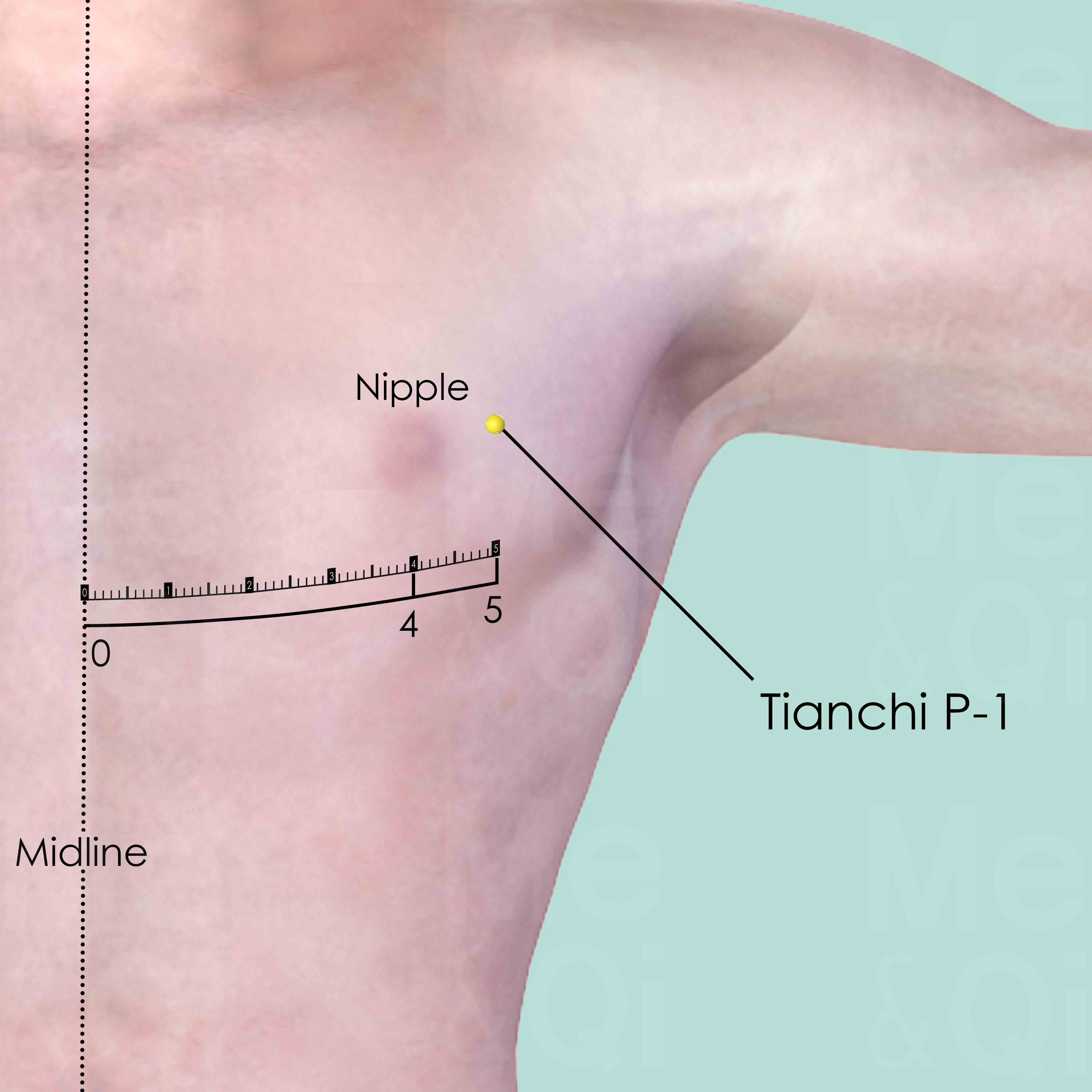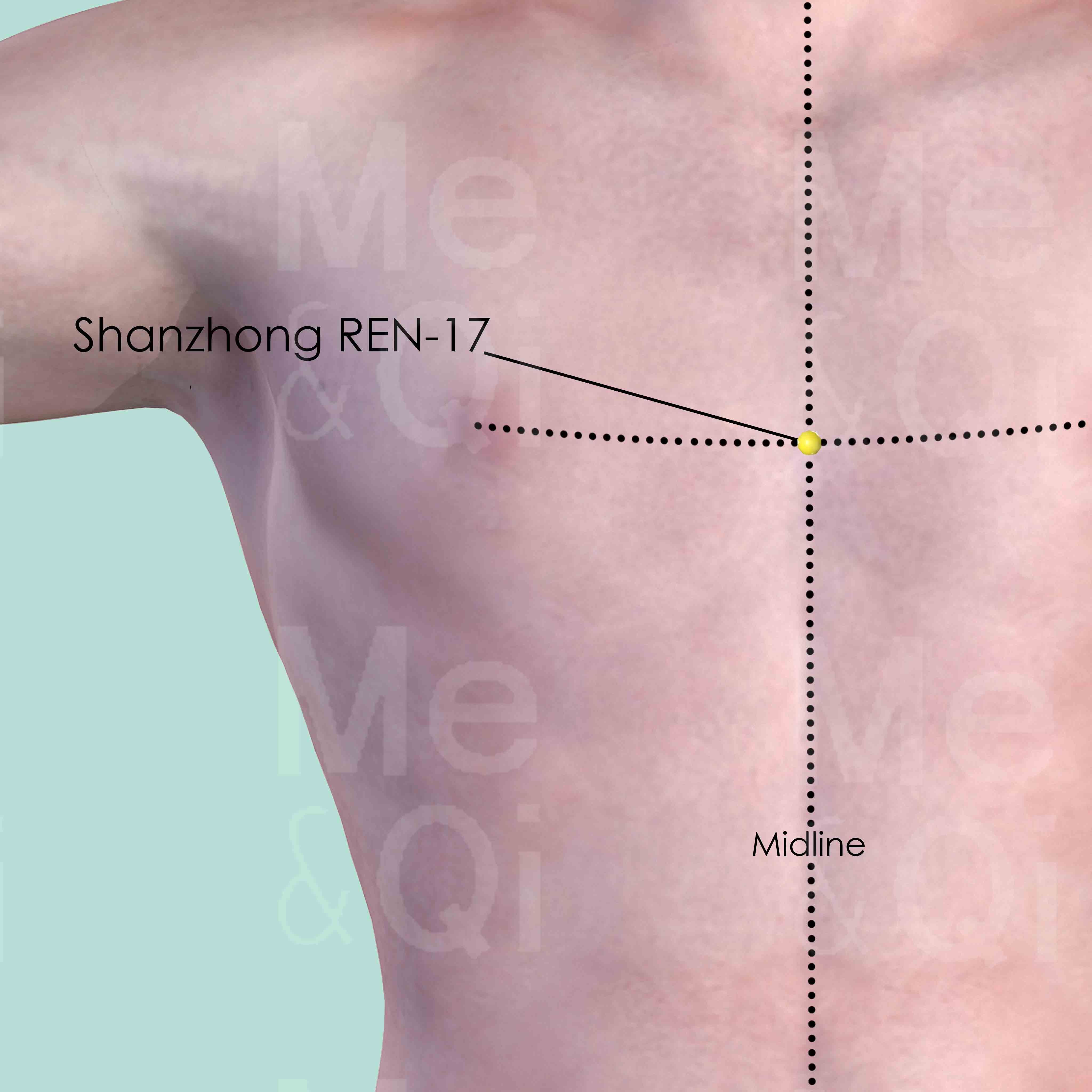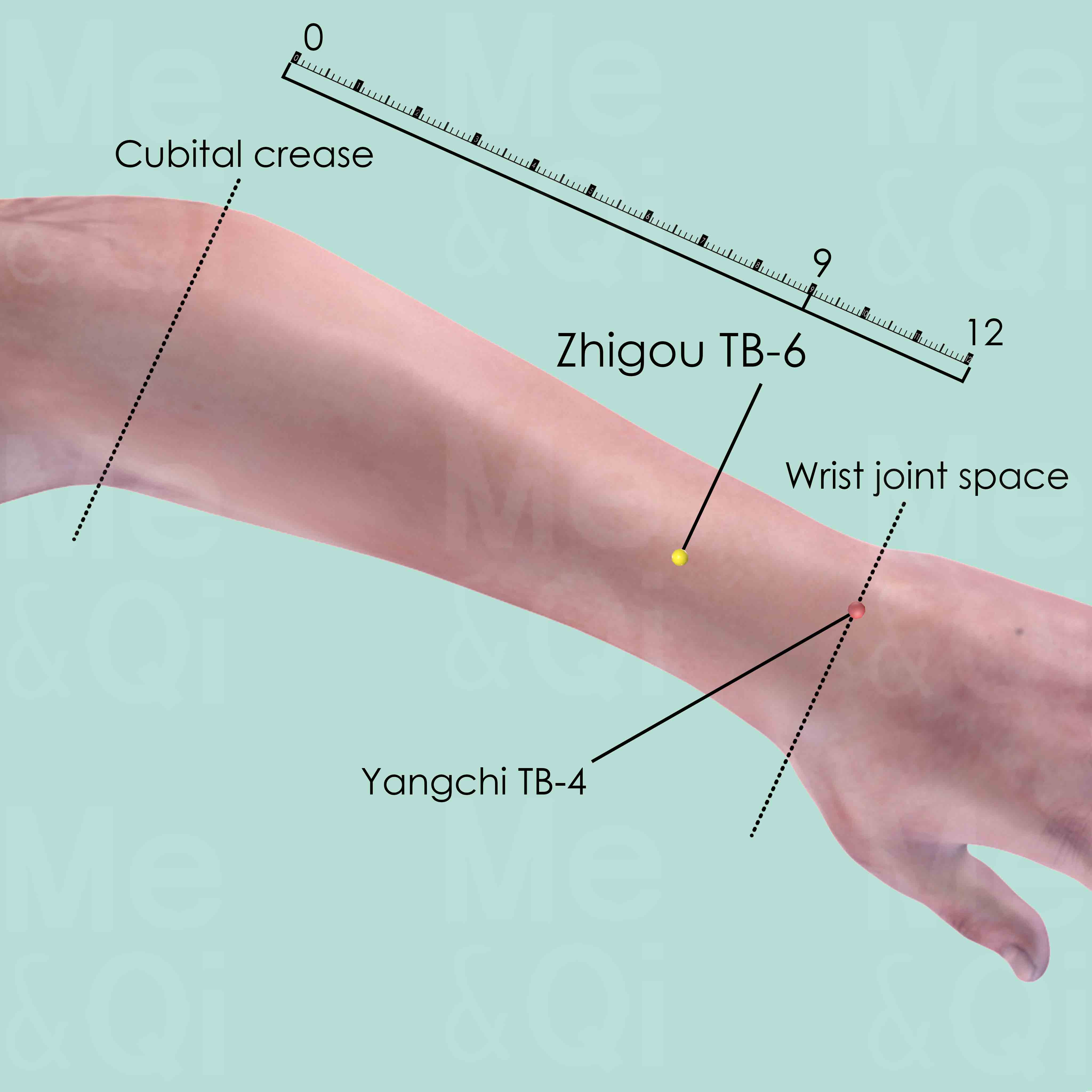Feeling Of Oppression Of The Chestaccording to TCM
Symptom family: Chest Discomfort & Sensations
Did you mean? Chest Distension
Root Causes of Feeling Of Oppression Of The Chest in TCM
Explore below more details about what might cause Feeling of oppression of the chest according to TCM.
- By Syndrome
- By Organ
- Phlegm
- Heat
- Qi Stagnation
- Blood Stasis
- Dampness
- Cold
- Mind Disturbance
- Wind
- Qi Deficiency
- Yin Excess
- View More Causes
- Heart
- Pericardium
- Lung
- Uterus
- Liver
- View More Organs
Phlegm
In TCM "Phlegm" as a pattern of disharmony is a complex concept that extends beyond the physical manifestation of mucus. It represents a pathological factor that can disrupt the flow of Qi (vital energy) and blood, leading to various health issues. Phlegm in TCM is seen as a sticky, turbid substance arising from the body's inability to metabolize fluids properly, often due to a dysfunction of the spleen. It's not only associated with respiratory problems like cough and congestion but also with systemic issues. Symptoms can include a feeling of heaviness, mental cloudiness, dizziness, and in some cases, the formation of lumps or masses. Phlegm can even be "invisible," contributing to emotional disturbances like depression or stress. ... see more
Phlegm Patterns That Can Lead to Feeling Of Oppression Of The Chest
Common Symptoms: Dizziness Depression Nausea Feeling Of Heaviness Sputum Edema Chest Distension Stifling Sensation In The Chest
| Pattern Name | Relevant Symptoms | Relevant Formulas |
|---|---|---|
| Phlegm | Chest pressure, Feeling of oppression of the chest, Head fog, Dizziness | Ling Gui Zhu Gan Tang | Xiao Ban Xia Tang | Er Chen Tang | Liu Jun Zi Tang | Ban Xia Bai Zhu Tian Ma Tang | Wen Dan Tang | Hao Qin Qing Dan Tang | Xing Su San |
| Cold-Phlegm | Feeling of oppression of the chest, White and watery sputum, Cold extremities, Nausea, Lack of appetite | Ling Gan Wu Wei Jiang Xin Tang | San Zi Yang Qin Tang |
| Cold-Phlegm in the Lungs | Feeling of oppression of the chest, Coughing, White and watery sputum, Chills, Cold hands, Sputum, Dizziness, Feeling of heaviness... see more | Ling Gui Zhu Gan Tang | Ling Gan Wu Wei Jiang Xin Tang | San Zi Yang Qin Tang |
| Damp-Phlegm in the Uterus | Feeling of oppression of the chest, Late menstruation, Amenorrhea, Scanty menstruation, Lower abdominal pain, Abdominal heaviness, Generalized fatigue, Diarrhea, Dull pale complexion, Obesity, Infertility, Ovarian cysts, Ovarian fibroids, Polycystic ovary syndrome, Pseudocyesis, Sputum, Feeling of heaviness... see more | Cang Fu Dao Tan Wan | Wei Ling Tang | Wan Dai Tang | Xiong Gui Er Chen Tang |
| Phlegm Fire harassing the Pericardium | Feeling of oppression of the chest, Palpitations, Flushed face, Bitter taste in the mouth, Noisy breathing, Restlessness, Insomnia, Vivid dreaming, Anxiety, Incoherent or confused speech, Confusion, Rash behaviour, Uncontrolled laughing or crying, Verbal aggression, Talking to oneself, Depression, Dull shallow face, Aggression, Chest pain, Rapid respiration... see more | Wen Dan Tang | Huang Lian Wen Dan Tang | Zhi Bao Dan | Hui Chun Dan |
| Phlegm-Fire harassing the Heart | Feeling of oppression of the chest, Palpitations, Flushed face, Bitter taste in the mouth, Noisy breathing, Restlessness, Insomnia, Vivid dreaming, Anxiety, Incoherent or confused speech, Confusion, Rash behaviour, Uncontrolled laughing or crying, Verbal aggression, Talking to oneself, Depression, Dull shallow face, Aggression... see more | Wen Dan Tang | Huang Lian Wen Dan Tang | Sheng Tie Luo Yin |
| Phlegm-Fluids above the diaphragm | Feeling of oppression of the chest, Coughing, Asthma, Edema, Dizziness, Profuse white sputum | Ling Gan Wu Wei Jiang Xin Tang | Xiao Qing Long Tang |
| Phlegm-Heat | Feeling of oppression of the chest, Upper abdominal oppression, Mucous in feces, Depression | Wen Dan Tang | Ding Chuan Tang | Qing Qi Hua Tan Wan | Gun Tan Wan |
| Wind-Phlegm | Feeling of oppression of the chest, Dizziness, Aphasia, Coughing and wheezing with copious sputum, Noisy breathing, Limb numbness... see more | Ban Xia Bai Zhu Tian Ma Tang |
Heat
In TCM "Heat" signifies an excess of Yang energy, leading to an imbalance where heat predominates over the body's cool Yin aspects. This condition is metaphorically akin to an internal over-heating. Symptoms indicative of Heat can include feelings of warmth, fever, sweating, irritability, red face, thirst with a preference for cold drinks, and a rapid pulse. The tongue may appear red with a yellow coating. Unlike the common interpretation of heat in terms of temperature, in TCM, it represents a state of hyperactivity or inflammation in the body.... see more
Heat Patterns That Can Lead to Feeling Of Oppression Of The Chest
Common Symptoms: Bitter Taste In The Mouth Thirst Restlessness Flushed Face Depression Insomnia Headaches Feeling Hot
| Pattern Name | Relevant Symptoms | Relevant Formulas |
|---|---|---|
| Damp-Heat | Chest pressure, Fever, Neck gland swelling, Headaches, Tight feeling in chest and stomach, Sticky taste in the mouth, Absence of thirst, Feeling hot, Feeling of heaviness, Bitter taste in the mouth, Acne... see more | Ba Zheng San |
| Phlegm Fire harassing the Pericardium | Feeling of oppression of the chest, Palpitations, Flushed face, Bitter taste in the mouth, Noisy breathing, Restlessness, Insomnia, Vivid dreaming, Anxiety, Incoherent or confused speech, Confusion, Rash behaviour, Uncontrolled laughing or crying, Verbal aggression, Talking to oneself, Depression, Dull shallow face, Aggression, Chest pain, Rapid respiration... see more | Wen Dan Tang | Huang Lian Wen Dan Tang | Zhi Bao Dan | Hui Chun Dan |
| Phlegm-Fire harassing the Heart | Feeling of oppression of the chest, Palpitations, Flushed face, Bitter taste in the mouth, Noisy breathing, Restlessness, Insomnia, Vivid dreaming, Anxiety, Incoherent or confused speech, Confusion, Rash behaviour, Uncontrolled laughing or crying, Verbal aggression, Talking to oneself, Depression, Dull shallow face, Aggression... see more | Wen Dan Tang | Huang Lian Wen Dan Tang | Sheng Tie Luo Yin |
| Phlegm-Heat | Feeling of oppression of the chest, Upper abdominal oppression, Mucous in feces, Depression | Wen Dan Tang | Ding Chuan Tang | Qing Qi Hua Tan Wan | Gun Tan Wan |
| Stagnant Liver Qi turning into Fire | Feeling of oppression of the chest, Hypochondriac distention, Upper abdominal distension, Irritability, Melancholia, Depression, Mood swings, Globus sensation, Feeling hot, Flushed face, Thirst, Anger, Pre menstrual tension, Irregular periods, Pre menstrual breast distension, Excessive menstruation... see more | Dan Zhi Xiao Yao San |
Qi Stagnation
Qi Stagnation in TCM is like having a traffic jam in your body's energy system. Qi, the vital life force that flows through your body, is supposed to move smoothly to maintain health and balance. But with Qi Stagnation, this flow gets blocked or slowed down, like cars stuck on a highway. This can lead to symptoms like feeling stressed, emotional mood swings, and physical discomfort, often described as a feeling of fullness or tightness, especially in the chest or abdomen. It's as though the body's internal energy circulation is disrupted, causing various issues. TCM sees this as an energy flow problem, different from modern medicine's focus on specific physiological processes.... see more
Qi Stagnation Patterns That Can Lead to Feeling Of Oppression Of The Chest
Common Symptoms: Depression Irritability Mood Swings Irregular Periods Breast Engorgement Abdominal Pain Chest Distension Purple Lips
| Pattern Name | Relevant Symptoms | Relevant Formulas |
|---|---|---|
| Qi And Blood Stagnation | Feeling of fullness in the chest, Chest distension, Chest pain, Stabbing fixed pain, Dark face, Purple lips, Purple nails, Irritability, Mood swings, Depression, Mottled skin, Foot edema, Abdominal masses, Melena black tarry stool, Menstrual cramps, Amenorrhea, Dark menstrual clots, Dark menstrual blood, Prolonged lochia, Irregular periods... see more | Ge Xia Zhu Yu Tang | Tao Hong Si Wu Tang | Shao Fu Zhu Yu Tang | Wu Yao Tang | Jia Wei Xiao Yao San | Wei Jing Tang |
| Heart Qi Stagnation | Feeling of oppression of the chest, Palpitations, Chest distension, Depression | Ban Xia Hou Pu Tang |
| Qi Stagnation | Feeling of oppression of the chest, General fullness, Moving pain, Depression, Irritability, Mood swings, Sighing | Chai Hu Shu Gan San | Xiao Yao San | Si Mo Tang | Qi Ge San |
| Stagnant Liver Qi turning into Fire | Feeling of oppression of the chest, Hypochondriac distention, Upper abdominal distension, Irritability, Melancholia, Depression, Mood swings, Globus sensation, Feeling hot, Flushed face, Thirst, Anger, Pre menstrual tension, Irregular periods, Pre menstrual breast distension, Excessive menstruation... see more | Dan Zhi Xiao Yao San |
Blood Stasis
Blood Stasis in TCM is a concept where the blood flow in the body is not as smooth or efficient as it should be. Imagine a river that's supposed to flow freely, but instead, it's getting blocked or moving too slowly in some parts. This can lead to various health issues, like pain that feels sharp or stabbing, dark bruises, and a complexion that looks purplish. TCM believes that good health relies on the smooth and vibrant flow of Qi and blood throughout the body, so when blood gets stuck, it's like a traffic jam in your body, leading to discomfort or health problems.... see more
Blood Stasis Patterns That Can Lead to Feeling Of Oppression Of The Chest
Common Symptoms: Purple Lips Purple Nails Chest Pain Depression Palpitations Chest Distension Menstrual Cramps Dark Menstrual Clots
| Pattern Name | Relevant Symptoms | Relevant Formulas |
|---|---|---|
| Qi And Blood Stagnation | Feeling of fullness in the chest, Chest distension, Chest pain, Stabbing fixed pain, Dark face, Purple lips, Purple nails, Irritability, Mood swings, Depression, Mottled skin, Foot edema, Abdominal masses, Melena black tarry stool, Menstrual cramps, Amenorrhea, Dark menstrual clots, Dark menstrual blood, Prolonged lochia, Irregular periods... see more | Ge Xia Zhu Yu Tang | Tao Hong Si Wu Tang | Shao Fu Zhu Yu Tang | Wu Yao Tang | Jia Wei Xiao Yao San | Wei Jing Tang |
| Heart Blood Stagnation | Feeling of oppression of the chest, Stabbing chest pain, Chest constriction | Xue Fu Zhu Yu Tang |
| Heart Vessel obstructed | Feeling of oppression of the chest, Palpitations, Shortness of breath, Depression, Restlessness, Heart pain, Chest pain, Sputum, Feeling of heaviness, Reluctance to speak, Cold extremities, Sighing, Purple lips, Purple nails, Purple face... see more | Xue Fu Zhu Yu Tang | Chai Hu Shu Gan San | Di Tan Tang | Dang Gui Si Ni Tang |
| Pericardium Blood Stagnation | Feeling of oppression of the chest, Palpitations, Chest pain, Chest distension, Stifling sensation in the chest, Shortness of breath, Purple lips, Purple nails, Menstrual cramps, Dark menstrual clots... see more | Xue Fu Zhu Yu Tang |
Dampness
"Dampness" in TCM is a concept that describes a pattern of disharmony where the body accumulates excess moisture. Imagine the heavy, sticky feeling you get on a very humid day; that's similar to what dampness feels like internally. It can manifest as a sense of heaviness, bloating, sluggishness, or even a foggy mind. This condition is often thought to arise from environmental factors like living in a damp place, dietary habits that promote moisture in the body, or internal imbalances that hinder the body's ability to process fluids properly. In TCM, dampness can obstruct the normal flow of energy and fluids in the body, leading to various symptoms.... see more
Dampness Patterns That Can Lead to Feeling Of Oppression Of The Chest
Common Symptoms: Headaches Feeling Of Heaviness Thick Menstrual Blood Sore And Weak Limbs Lower Abdominal Pain Generalized Fatigue Leukorrhea Diarrhea
| Pattern Name | Relevant Symptoms | Relevant Formulas |
|---|---|---|
| Damp-Heat | Chest pressure, Fever, Neck gland swelling, Headaches, Tight feeling in chest and stomach, Sticky taste in the mouth, Absence of thirst, Feeling hot, Feeling of heaviness, Bitter taste in the mouth, Acne... see more | Ba Zheng San |
| Wind-Cold-Damp invading with Qi Deficiency | Feeling of fullness in the chest, High fever, Fever without perspiration, Headaches, Neck pain, Stiff neck, Painful extremities, Focal distention, Chest distension, Congested nose, Noisy breathing, Coughing... see more | Ren Shen Bai Du San |
| Damp-Phlegm in the Uterus | Feeling of oppression of the chest, Late menstruation, Amenorrhea, Scanty menstruation, Lower abdominal pain, Abdominal heaviness, Generalized fatigue, Diarrhea, Dull pale complexion, Obesity, Infertility, Ovarian cysts, Ovarian fibroids, Polycystic ovary syndrome, Pseudocyesis, Sputum, Feeling of heaviness... see more | Cang Fu Dao Tan Wan | Wei Ling Tang | Wan Dai Tang | Xiong Gui Er Chen Tang |
Cold
In TCM "Cold" as a pattern of disharmony refers to a specific type of imbalance within the body's systems, often linked to a deficiency or weakness. It's not about feeling physically cold or having a common cold, but rather a metaphorical description of certain symptoms and underlying conditions. When a TCM practitioner says someone suffers from "Cold," it usually implies that the body's Yang energy, which is warm and active, is insufficient or overpowered by Yin energy, which is cool and passive. Symptoms of Cold in TCM can include a general feeling of coldness, cold limbs, pale complexion, low energy, slow metabolism, and a preference for warmth. ... see more
Cold Patterns That Can Lead to Feeling Of Oppression Of The Chest
Common Symptoms: Coughing White And Watery Sputum High Fever Fever Without Perspiration Headaches Neck Pain Stiff Neck Painful Extremities
| Pattern Name | Relevant Symptoms | Relevant Formulas |
|---|---|---|
| Wind-Cold-Damp invading with Qi Deficiency | Feeling of fullness in the chest, High fever, Fever without perspiration, Headaches, Neck pain, Stiff neck, Painful extremities, Focal distention, Chest distension, Congested nose, Noisy breathing, Coughing... see more | Ren Shen Bai Du San |
| Cold-Phlegm | Feeling of oppression of the chest, White and watery sputum, Cold extremities, Nausea, Lack of appetite | Ling Gan Wu Wei Jiang Xin Tang | San Zi Yang Qin Tang |
| Cold-Phlegm in the Lungs | Feeling of oppression of the chest, Coughing, White and watery sputum, Chills, Cold hands, Sputum, Dizziness, Feeling of heaviness... see more | Ling Gui Zhu Gan Tang | Ling Gan Wu Wei Jiang Xin Tang | San Zi Yang Qin Tang |
Mind Disturbance
In TCM "Shen" refers to the mind or spirit, and a Shen disturbance is a pattern of disharmony that affects the mental and emotional state. This concept reflects the TCM belief in the deep interconnectedness of mind and body. Symptoms of Shen disturbance can vary widely but often include anxiety, insomnia, restlessness, confusion, or in severe cases, hallucinations or delirium. These symptoms indicate an imbalance in the body's energies affecting the heart, which in TCM is not only the center of blood circulation but also the seat of the mind and consciousness. The root of Shen disturbance can be traced to various factors, including emotional stress, physical illness, or an imbalance in fundamental substances like Qi, Yin, or Yang.... see more
Mind Disturbance Patterns That Can Lead to Feeling Of Oppression Of The Chest
Common Symptoms: Palpitations Flushed Face Bitter Taste In The Mouth Noisy Breathing Restlessness Insomnia Vivid Dreaming Anxiety
| Pattern Name | Relevant Symptoms | Relevant Formulas |
|---|---|---|
| Phlegm Fire harassing the Pericardium | Feeling of oppression of the chest, Palpitations, Flushed face, Bitter taste in the mouth, Noisy breathing, Restlessness, Insomnia, Vivid dreaming, Anxiety, Incoherent or confused speech, Confusion, Rash behaviour, Uncontrolled laughing or crying, Verbal aggression, Talking to oneself, Depression, Dull shallow face, Aggression, Chest pain, Rapid respiration... see more | Wen Dan Tang | Huang Lian Wen Dan Tang | Zhi Bao Dan | Hui Chun Dan |
| Phlegm-Fire harassing the Heart | Feeling of oppression of the chest, Palpitations, Flushed face, Bitter taste in the mouth, Noisy breathing, Restlessness, Insomnia, Vivid dreaming, Anxiety, Incoherent or confused speech, Confusion, Rash behaviour, Uncontrolled laughing or crying, Verbal aggression, Talking to oneself, Depression, Dull shallow face, Aggression... see more | Wen Dan Tang | Huang Lian Wen Dan Tang | Sheng Tie Luo Yin |
Wind
In TCM "Wind" is a concept that represents a pattern of disharmony, often characterized by its sudden and unpredictable nature, much like a gusty wind changing direction without warning. This pattern is associated with symptoms that come and go quickly or move around the body, such as itching, tremors, or even certain types of pain. Wind is considered to be a primary cause of illnesses that have these rapidly changing characteristics. In TCM, external Wind often refers to illnesses that start suddenly, like the common cold, believed to be caused by external pathogenic factors like climatic changes. On the other hand, internal Wind can be linked to internal imbalances and can manifest in conditions like dizziness or spasms. ... see more
Wind Patterns That Can Lead to Feeling Of Oppression Of The Chest
Common Symptoms: Headaches Noisy Breathing High Fever Fever Without Perspiration Neck Pain Stiff Neck Painful Extremities Focal Distention
| Pattern Name | Relevant Symptoms | Relevant Formulas |
|---|---|---|
| Wind-Cold-Damp invading with Qi Deficiency | Feeling of fullness in the chest, High fever, Fever without perspiration, Headaches, Neck pain, Stiff neck, Painful extremities, Focal distention, Chest distension, Congested nose, Noisy breathing, Coughing... see more | Ren Shen Bai Du San |
| Wind-Phlegm | Feeling of oppression of the chest, Dizziness, Aphasia, Coughing and wheezing with copious sputum, Noisy breathing, Limb numbness... see more | Ban Xia Bai Zhu Tian Ma Tang |
Qi Deficiency
Qi Deficiency in TCM is like running low on battery power. Qi is the vital energy that powers every function in your body. When there's a Qi Deficiency, it means your body doesn't have enough of this essential energy. This can make you feel tired all the time, weak, or even cause shortness of breath. It's similar to how you feel when you haven't had enough sleep or nutritious food. Your body just doesn't have the energy it needs to perform at its best. Unlike modern medicine, which often focuses on specific physical causes for fatigue and weakness, TCM views Qi Deficiency as an overall energy depletion that affects your entire well-being, and it seeks to replenish and balance this vital energy.... see more
Qi Deficiency Patterns That Can Lead to Feeling Of Oppression Of The Chest
| Pattern Name | Relevant Symptoms | Relevant Formulas |
|---|---|---|
| Wind-Cold-Damp invading with Qi Deficiency | Feeling of fullness in the chest, High fever, Fever without perspiration, Headaches, Neck pain, Stiff neck, Painful extremities, Focal distention, Chest distension, Congested nose, Noisy breathing, Coughing... see more | Ren Shen Bai Du San |
Yin Excess
Yin Excess in TCM is a pattern of disharmony characterized by an overabundance of Yin energy, leading to symptoms of dampness and coldness in the body. This condition often results from an imbalance where the cooling, moistening aspects of Yin overshadow the warm, active qualities of Yang energy. Symptoms can include a feeling of heaviness, lethargy, cold sensations, pale complexion, and possibly edema or fluid retention. Digestive issues such as poor appetite, bloating, and loose stools may also be present, reflecting the impact of excess Yin on the body's metabolic processes. Treatment in TCM for Yin Excess focuses on reducing the excess Yin and stimulating Yang energy to restore balance. ... see more
Yin Excess Patterns That Can Lead to Feeling Of Oppression Of The Chest
| Pattern Name | Relevant Symptoms | Relevant Formulas |
|---|---|---|
| Yin Excess | Feeling of oppression, Absence of thirst, Slow and forceful movement, Epigastric pain worsen by pressure, Polyuria, Feeling of oppression of the chest, Nausea, Excessive vaginal discharge, Lack of appetite, Pain relieved by heat, Chills, Cold extremities, Pale urine... see more | Wu Ling San | Wu Pi Yin |
Heart
In TCM the Heart is considered the "emperor" of all organs, primarily responsible for governing Blood and housing the mind, known as "Shen." It plays a crucial role in maintaining mental-emotional equilibrium and controlling the circulation of Qi and blood throughout the body. When the Heart is imbalanced or malfunctions in TCM, it can lead to a range of issues like heart palpitations, insomnia, dream-disturbed sleep, anxiety, and a flushed complexion. Emotional disturbances such as excessive joy or lack of joy are also seen as signs of Heart disharmony. These symptoms reflect not just physical heart conditions but also the state of one's Shen, indicating the interconnectedness of physical and emotional well-being in TCM.... see more
Heart Patterns That Can Lead to Feeling Of Oppression Of The Chest
Common Symptoms: Palpitations Purple Lips Depression Purple Nails Purple Face Aggression Shortness Of Breath Sighing
| Pattern Name | Relevant Symptoms | Relevant Formulas |
|---|---|---|
| Heart Blood Stagnation | Feeling of oppression of the chest, Stabbing chest pain, Chest constriction | Xue Fu Zhu Yu Tang |
| Heart Qi Stagnation | Feeling of oppression of the chest, Palpitations, Chest distension, Depression | Ban Xia Hou Pu Tang |
| Heart Vessel obstructed | Feeling of oppression of the chest, Palpitations, Shortness of breath, Depression, Restlessness, Heart pain, Chest pain, Sputum, Feeling of heaviness, Reluctance to speak, Cold extremities, Sighing, Purple lips, Purple nails, Purple face... see more | Xue Fu Zhu Yu Tang | Chai Hu Shu Gan San | Di Tan Tang | Dang Gui Si Ni Tang |
| Phlegm-Fire harassing the Heart | Feeling of oppression of the chest, Palpitations, Flushed face, Bitter taste in the mouth, Noisy breathing, Restlessness, Insomnia, Vivid dreaming, Anxiety, Incoherent or confused speech, Confusion, Rash behaviour, Uncontrolled laughing or crying, Verbal aggression, Talking to oneself, Depression, Dull shallow face, Aggression... see more | Wen Dan Tang | Huang Lian Wen Dan Tang | Sheng Tie Luo Yin |
Pericardium
In TCM the Pericardium is more than a physical membrane protecting the heart; it's considered an organ system that acts as the "Heart's protector." It plays a crucial role in safeguarding the heart from external pathogenic factors and emotional disturbances. The Pericardium is also involved in regulating blood circulation and influencing emotional well-being, especially in terms of relationships and intimacy. When the Pericardium malfunctions or is imbalanced in TCM, it can lead to symptoms that mirror heart issues, such as chest pain or palpitations, but often with an emotional component like difficulty in forming emotional connections or excessive vulnerability to external stressors. Additionally, a disturbed Pericardium can result in sleep disturbances, anxiety, and in severe cases, mental confusion, reflecting its integral role in both physical heart protection and emotional balance.... see more
Pericardium Patterns That Can Lead to Feeling Of Oppression Of The Chest
Common Symptoms: Palpitations Depression Chest Pain Flushed Face Bitter Taste In The Mouth Noisy Breathing Restlessness Insomnia
| Pattern Name | Relevant Symptoms | Relevant Formulas |
|---|---|---|
| Phlegm Fire harassing the Pericardium | Feeling of oppression of the chest, Palpitations, Flushed face, Bitter taste in the mouth, Noisy breathing, Restlessness, Insomnia, Vivid dreaming, Anxiety, Incoherent or confused speech, Confusion, Rash behaviour, Uncontrolled laughing or crying, Verbal aggression, Talking to oneself, Depression, Dull shallow face, Aggression, Chest pain, Rapid respiration... see more | Wen Dan Tang | Huang Lian Wen Dan Tang | Zhi Bao Dan | Hui Chun Dan |
| Pericardium Blood Stagnation | Feeling of oppression of the chest, Palpitations, Chest pain, Chest distension, Stifling sensation in the chest, Shortness of breath, Purple lips, Purple nails, Menstrual cramps, Dark menstrual clots... see more | Xue Fu Zhu Yu Tang |
Lung
In TCM the Lungs are seen as the organ responsible for controlling Qi and respiration, as well as being a key part of the body's defensive system. They are thought to maintain the balance and flow of air and moisture, and are closely linked to the skin and hair. When the Lungs are imbalanced or malfunctioning in TCM, it can lead to respiratory issues like coughing or asthma, a weakened immune system, dry skin, and emotional disturbances such as sadness or grief. These symptoms are believed to arise from disruptions in the Lungs' ability to regulate Qi and protect the body, highlighting their central role in maintaining overall health and well-being.... see more
Lung Patterns That Can Lead to Feeling Of Oppression Of The Chest
| Pattern Name | Relevant Symptoms | Relevant Formulas |
|---|---|---|
| Cold-Phlegm in the Lungs | Feeling of oppression of the chest, Coughing, White and watery sputum, Chills, Cold hands, Sputum, Dizziness, Feeling of heaviness... see more | Ling Gui Zhu Gan Tang | Ling Gan Wu Wei Jiang Xin Tang | San Zi Yang Qin Tang |
Uterus
In TCM the Uterus (or "Bao Gong") is not just a reproductive organ but a vital system closely linked to Kidney energy, responsible for menstrual health, fertility, and pregnancy. It's also connected to the Heart and Liver, reflecting the importance of emotional and blood health in reproductive wellness. In TCM, the Uterus is seen as a reservoir of Blood and Qi, crucial for reproductive health and general vitality. When the Uterus malfunctions or is imbalanced, it can lead to menstrual irregularities, infertility, miscarriages, or menopausal symptoms. Additionally, there might be symptoms like lower abdominal pain or emotional disturbances such as mood swings, often linked to Liver Qi stagnation. These manifestations highlight the TCM perspective that the health of the Uterus is intertwined with the overall balance of energy and blood in the body, as well as emotional well-being.... see more
Uterus Patterns That Can Lead to Feeling Of Oppression Of The Chest
| Pattern Name | Relevant Symptoms | Relevant Formulas |
|---|---|---|
| Damp-Phlegm in the Uterus | Feeling of oppression of the chest, Late menstruation, Amenorrhea, Scanty menstruation, Lower abdominal pain, Abdominal heaviness, Generalized fatigue, Diarrhea, Dull pale complexion, Obesity, Infertility, Ovarian cysts, Ovarian fibroids, Polycystic ovary syndrome, Pseudocyesis, Sputum, Feeling of heaviness... see more | Cang Fu Dao Tan Wan | Wei Ling Tang | Wan Dai Tang | Xiong Gui Er Chen Tang |
Liver
In TCM the Liver is viewed as the organ responsible for the smooth flow of Qi, Blood, and emotions throughout the body. It plays a key role in regulating mood, storing blood, supporting digestion, and ensuring the health of tendons and eyes. When the Liver malfunctions or is imbalanced in TCM, it can lead to a range of issues such as irritability, mood swings, menstrual irregularities, eye problems, and muscular stiffness or pain. A malfunctioning Liver in TCM reflects not only physical disturbances but also emotional and mental disharmony, emphasizing the holistic approach of TCM in addressing health and wellness.... see more
Liver Patterns That Can Lead to Feeling Of Oppression Of The Chest
| Pattern Name | Relevant Symptoms | Relevant Formulas |
|---|---|---|
| Stagnant Liver Qi turning into Fire | Feeling of oppression of the chest, Hypochondriac distention, Upper abdominal distension, Irritability, Melancholia, Depression, Mood swings, Globus sensation, Feeling hot, Flushed face, Thirst, Anger, Pre menstrual tension, Irregular periods, Pre menstrual breast distension, Excessive menstruation... see more | Dan Zhi Xiao Yao San |
TCM Herbal Formulas for Feeling Of Oppression Of The Chest
Explore below some TCM herbal formulas used to address feeling of oppression of the chest, organized by cause and by formula type.
- By Cause
- By Formula Type
- Phlegm
- Heat
- Qi Stagnation
- Blood Stasis
- Dampness
- Cold
- Mind Disturbance
- Wind
- Qi Deficiency
- Yin Excess
- View More Causes
- Formulas that promote qi movement
- Formulas that dry dampness and transform phlegm
- Formulas that invigorate blood and dispel blood stagnation
- Formulas for a rebellious qi
- Formulas that harmonize liver-Spleen
- Formulas that warm and transform phlegm-Cold
- Formulas that clear heat and open sensory orifices
- Formulas that clear heat and transform phlegm
- Formulas that promote urination and leach out dampness
- Formulas that clear heat and expel dampness
- Formulas that warm and transform water and dampness
- Formulas that tonify blood
- Formulas that clear internal abscesses and sores
- External formulas for external disorders
- Formulas that expel dampness
- Formulas that secure irregular uterine bleeding and stop vaginal discharge
- Formulas that dispel phlegm
- Formulas that warm interior cold
- Formulas that tonify qi
- Formulas that transform phlegm and extinguish wind
- Formulas that harmonize lesser yang-warp disorders
- Formulas that disperse dryness and moisten
- Formulas that sedate and calm the mind
- Formulas that clear wind-Cold
- Formulas that clear liver-Heat
Top Formula for Phlegm:
Wen Dan Tang
Suitable for Phlegm patterns that may cause feeling of oppression of the chest, such as Phlegm or Phlegm Fire harassing the Pericardium
Learn moreAll Formulas Recommended for Feeling Of Oppression Of The Chest Caused by Phlegm
| Formula | Patterns Suitable For |
|---|---|
| Wen Dan Tang | Phlegm, Phlegm Fire harassing the Pericardium, Phlegm-Fire harassing the Heart, Phlegm-Heat... see more |
| Ling Gan Wu Wei Jiang Xin Tang | Cold-Phlegm, Cold-Phlegm in the Lungs, Phlegm-Fluids above the diaphragm |
| Ling Gui Zhu Gan Tang | Phlegm, Cold-Phlegm in the Lungs |
| Ban Xia Bai Zhu Tian Ma Tang | Phlegm, Wind-Phlegm |
| San Zi Yang Qin Tang | Cold-Phlegm, Cold-Phlegm in the Lungs |
| Huang Lian Wen Dan Tang | Phlegm Fire harassing the Pericardium, Phlegm-Fire harassing the Heart |
| Xiao Ban Xia Tang | Phlegm |
| Er Chen Tang | Phlegm |
| Liu Jun Zi Tang | Phlegm |
| Hao Qin Qing Dan Tang | Phlegm |
| Xing Su San | Phlegm |
| Cang Fu Dao Tan Wan | Damp-Phlegm in the Uterus |
| Wei Ling Tang | Damp-Phlegm in the Uterus |
| Wan Dai Tang | Damp-Phlegm in the Uterus |
| Xiong Gui Er Chen Tang | Damp-Phlegm in the Uterus |
| Zhi Bao Dan | Phlegm Fire harassing the Pericardium |
| Hui Chun Dan | Phlegm Fire harassing the Pericardium |
| Sheng Tie Luo Yin | Phlegm-Fire harassing the Heart |
| Xiao Qing Long Tang | Phlegm-Fluids above the diaphragm |
| Ding Chuan Tang | Phlegm-Heat |
| Qing Qi Hua Tan Wan | Phlegm-Heat |
| Gun Tan Wan | Phlegm-Heat |
Top Formula for Heat:
Wen Dan Tang
Suitable for Heat patterns that may cause feeling of oppression of the chest, such as Phlegm Fire harassing the Pericardium or Phlegm-Fire harassing the Heart
Learn moreAll Formulas Recommended for Feeling Of Oppression Of The Chest Caused by Heat
| Formula | Patterns Suitable For |
|---|---|
| Wen Dan Tang | Phlegm Fire harassing the Pericardium, Phlegm-Fire harassing the Heart, Phlegm-Heat... see more |
| Huang Lian Wen Dan Tang | Phlegm Fire harassing the Pericardium, Phlegm-Fire harassing the Heart |
| Ba Zheng San | Damp-Heat |
| Zhi Bao Dan | Phlegm Fire harassing the Pericardium |
| Hui Chun Dan | Phlegm Fire harassing the Pericardium |
| Sheng Tie Luo Yin | Phlegm-Fire harassing the Heart |
| Ding Chuan Tang | Phlegm-Heat |
| Qing Qi Hua Tan Wan | Phlegm-Heat |
| Gun Tan Wan | Phlegm-Heat |
| Dan Zhi Xiao Yao San | Stagnant Liver Qi turning into Fire |
Top Formula for Qi Stagnation:
Chai Hu Shu Gan San
Suitable for Qi Stagnation patterns that may cause feeling of oppression of the chest, such as Qi Stagnation
Learn moreAll Formulas Recommended for Feeling Of Oppression Of The Chest Caused by Qi Stagnation
| Formula | Patterns Suitable For |
|---|---|
| Chai Hu Shu Gan San | Qi Stagnation |
| Ge Xia Zhu Yu Tang | Qi And Blood Stagnation |
| Tao Hong Si Wu Tang | Qi And Blood Stagnation |
| Shao Fu Zhu Yu Tang | Qi And Blood Stagnation |
| Wu Yao Tang | Qi And Blood Stagnation |
| Jia Wei Xiao Yao San | Qi And Blood Stagnation |
| Wei Jing Tang | Qi And Blood Stagnation |
| Ban Xia Hou Pu Tang | Heart Qi Stagnation |
| Xiao Yao San | Qi Stagnation |
| Si Mo Tang | Qi Stagnation |
| Qi Ge San | Qi Stagnation |
| Dan Zhi Xiao Yao San | Stagnant Liver Qi turning into Fire |
Top Formula for Blood Stasis:
Xue Fu Zhu Yu Tang
Suitable for Blood Stasis patterns that may cause feeling of oppression of the chest, such as Heart Blood Stagnation or Heart Vessel obstructed
Learn moreAll Formulas Recommended for Feeling Of Oppression Of The Chest Caused by Blood Stasis
| Formula | Patterns Suitable For |
|---|---|
| Xue Fu Zhu Yu Tang | Heart Blood Stagnation, Heart Vessel obstructed, Pericardium Blood Stagnation |
| Chai Hu Shu Gan San | Heart Vessel obstructed |
| Ge Xia Zhu Yu Tang | Qi And Blood Stagnation |
| Tao Hong Si Wu Tang | Qi And Blood Stagnation |
| Shao Fu Zhu Yu Tang | Qi And Blood Stagnation |
| Wu Yao Tang | Qi And Blood Stagnation |
| Jia Wei Xiao Yao San | Qi And Blood Stagnation |
| Wei Jing Tang | Qi And Blood Stagnation |
| Di Tan Tang | Heart Vessel obstructed |
| Dang Gui Si Ni Tang | Heart Vessel obstructed |
Top Formula for Dampness:
Ba Zheng San
Suitable for Dampness patterns that may cause feeling of oppression of the chest, such as Damp-Heat
Learn moreAll Formulas Recommended for Feeling Of Oppression Of The Chest Caused by Dampness
| Formula | Patterns Suitable For |
|---|---|
| Ba Zheng San | Damp-Heat |
| Ren Shen Bai Du San | Wind-Cold-Damp invading with Qi Deficiency |
| Cang Fu Dao Tan Wan | Damp-Phlegm in the Uterus |
| Wei Ling Tang | Damp-Phlegm in the Uterus |
| Wan Dai Tang | Damp-Phlegm in the Uterus |
| Xiong Gui Er Chen Tang | Damp-Phlegm in the Uterus |
Top Formula for Cold:
Ling Gan Wu Wei Jiang Xin Tang
Suitable for Cold patterns that may cause feeling of oppression of the chest, such as Cold-Phlegm or Cold-Phlegm in the Lungs
Learn moreAll Formulas Recommended for Feeling Of Oppression Of The Chest Caused by Cold
| Formula | Patterns Suitable For |
|---|---|
| Ling Gan Wu Wei Jiang Xin Tang | Cold-Phlegm, Cold-Phlegm in the Lungs |
| San Zi Yang Qin Tang | Cold-Phlegm, Cold-Phlegm in the Lungs |
| Ling Gui Zhu Gan Tang | Cold-Phlegm in the Lungs |
| Ren Shen Bai Du San | Wind-Cold-Damp invading with Qi Deficiency |
Top Formula for Mind Disturbance:
Wen Dan Tang
Suitable for Mind Disturbance patterns that may cause feeling of oppression of the chest, such as Phlegm Fire harassing the Pericardium or Phlegm-Fire harassing the Heart
Learn moreAll Formulas Recommended for Feeling Of Oppression Of The Chest Caused by Mind Disturbance
| Formula | Patterns Suitable For |
|---|---|
| Wen Dan Tang | Phlegm Fire harassing the Pericardium, Phlegm-Fire harassing the Heart |
| Huang Lian Wen Dan Tang | Phlegm Fire harassing the Pericardium, Phlegm-Fire harassing the Heart |
| Zhi Bao Dan | Phlegm Fire harassing the Pericardium |
| Hui Chun Dan | Phlegm Fire harassing the Pericardium |
| Sheng Tie Luo Yin | Phlegm-Fire harassing the Heart |
Top Formula for Wind:
Ban Xia Bai Zhu Tian Ma Tang
Suitable for Wind patterns that may cause feeling of oppression of the chest, such as Wind-Phlegm
Learn moreAll Formulas Recommended for Feeling Of Oppression Of The Chest Caused by Wind
| Formula | Patterns Suitable For |
|---|---|
| Ban Xia Bai Zhu Tian Ma Tang | Wind-Phlegm |
| Ren Shen Bai Du San | Wind-Cold-Damp invading with Qi Deficiency |
Top Formula for Qi Deficiency:
Ren Shen Bai Du San
Suitable for Qi Deficiency patterns that may cause feeling of oppression of the chest, such as Wind-Cold-Damp invading with Qi Deficiency
Learn moreTop Formula for Yin Excess:
Wu Ling San
Suitable for Yin Excess patterns that may cause feeling of oppression of the chest, such as Yin Excess
Learn moreAll Formulas Recommended for Feeling Of Oppression Of The Chest Caused by Yin Excess
| Formula | Patterns Suitable For |
|---|---|
| Wu Ling San | Yin Excess |
| Wu Pi Yin | Yin Excess |
Formulas that dry Dampness and transform Phlegm
These formulas are suitable for some feeling of oppression of the chest-causing patterns like Phlegm or Phlegm Fire harassing the Pericardium.
One such formula is Wen Dan Tang, with crow-dipper rhizome as a key herb.
Other formulas of this category are listed in the table below.
All "formulas that dry dampness and transform phlegm" recommended for feeling of oppression of the chest
| Formula | Patterns Suitable For (if applicable) |
|---|---|
| Wen Dan Tang | Phlegm, Phlegm Fire harassing the Pericardium, Phlegm-Fire harassing the Heart, Phlegm-Heat... see more |
| Huang Lian Wen Dan Tang | Phlegm Fire harassing the Pericardium, Phlegm-Fire harassing the Heart |
| Cang Fu Dao Tan Wan | Damp-Phlegm in the Uterus |
| Xiong Gui Er Chen Tang | Damp-Phlegm in the Uterus |
| Er Chen Tang | Phlegm |
Formulas that promote Qi movement
These formulas are suitable for some feeling of oppression of the chest-causing patterns like Heart Vessel obstructed or Qi Stagnation.
One such formula is Chai Hu Shu Gan San, with bupleurum root as a key herb.
Other formulas of this category are listed in the table below.
All "formulas that promote qi movement" recommended for feeling of oppression of the chest
| Formula | Patterns Suitable For (if applicable) |
|---|---|
| Chai Hu Shu Gan San | Heart Vessel obstructed, Qi Stagnation |
| Wu Yao Tang | Qi And Blood Stagnation |
| Ban Xia Hou Pu Tang | Heart Qi Stagnation |
| Si Mo Tang | Qi Stagnation |
| Qi Ge San | Qi Stagnation |
Formulas that invigorate Blood and dispel Blood Stagnation
These formulas are suitable for some feeling of oppression of the chest-causing patterns like Heart Blood Stagnation or Heart Vessel obstructed.
One such formula is Xue Fu Zhu Yu Tang, with peach kernel as a key herb.
Other formulas of this category are listed in the table below.
All "formulas that invigorate blood and dispel blood stagnation" recommended for feeling of oppression of the chest
| Formula | Patterns Suitable For (if applicable) |
|---|---|
| Xue Fu Zhu Yu Tang | Heart Blood Stagnation, Heart Vessel obstructed, Pericardium Blood Stagnation |
| Ge Xia Zhu Yu Tang | Qi And Blood Stagnation |
| Shao Fu Zhu Yu Tang | Qi And Blood Stagnation |
Formulas that warm and transform Phlegm-Cold
These formulas are suitable for some feeling of oppression of the chest-causing patterns like Cold-Phlegm or Cold-Phlegm in the Lungs.
One such formula is Ling Gan Wu Wei Jiang Xin Tang, with dried ginger as a key herb.
Other formulas of this category are listed in the table below.
All "formulas that warm and transform phlegm-Cold" recommended for feeling of oppression of the chest
| Formula | Patterns Suitable For (if applicable) |
|---|---|
| Ling Gan Wu Wei Jiang Xin Tang | Cold-Phlegm, Cold-Phlegm in the Lungs, Phlegm-Fluids above the diaphragm |
| San Zi Yang Qin Tang | Cold-Phlegm, Cold-Phlegm in the Lungs |
Formulas for a rebellious Qi
These formulas are suitable for some feeling of oppression of the chest-causing patterns like Phlegm.
One such formula is Xiao Ban Xia Tang, with crow-dipper rhizome as a key herb.
Other formulas of this category are listed in the table below.
All "formulas for a rebellious qi" recommended for feeling of oppression of the chest
| Formula | Patterns Suitable For (if applicable) |
|---|---|
| Xiao Ban Xia Tang | Phlegm |
| Ding Chuan Tang | Phlegm-Heat |
Formulas that harmonize Liver-Spleen
These formulas are suitable for some feeling of oppression of the chest-causing patterns like Qi And Blood Stagnation.
One such formula is Jia Wei Xiao Yao San, with bupleurum root as a key herb.
Other formulas of this category are listed in the table below.
All "formulas that harmonize liver-Spleen" recommended for feeling of oppression of the chest
| Formula | Patterns Suitable For (if applicable) |
|---|---|
| Jia Wei Xiao Yao San | Qi And Blood Stagnation |
| Xiao Yao San | Qi Stagnation |
Formulas that warm and transform water and Dampness
These formulas are suitable for some feeling of oppression of the chest-causing patterns like Phlegm or Cold-Phlegm in the Lungs.
One such formula is Ling Gui Zhu Gan Tang, with poria-cocos mushroom as a key herb.
Formulas that transform Phlegm and extinguish Wind
These formulas are suitable for some feeling of oppression of the chest-causing patterns like Phlegm or Wind-Phlegm.
One such formula is Ban Xia Bai Zhu Tian Ma Tang, with crow-dipper rhizome as a key herb.
Formulas that clear Heat and open sensory orifices
These formulas are suitable for some feeling of oppression of the chest-causing patterns like Phlegm Fire harassing the Pericardium.
One such formula is Zhi Bao Dan, with water buffalo horn as a key herb.
Other formulas of this category are listed in the table below.
All "formulas that clear heat and open sensory orifices" recommended for feeling of oppression of the chest
| Formula | Patterns Suitable For (if applicable) |
|---|---|
| Zhi Bao Dan | Phlegm Fire harassing the Pericardium |
| Hui Chun Dan | Phlegm Fire harassing the Pericardium |
Formulas that clear Heat and transform Phlegm
These formulas are suitable for some feeling of oppression of the chest-causing patterns like Phlegm-Heat.
One such formula is Qing Qi Hua Tan Wan, with arisaema with bile as a key herb.
Other formulas of this category are listed in the table below.
All "formulas that clear heat and transform phlegm" recommended for feeling of oppression of the chest
| Formula | Patterns Suitable For (if applicable) |
|---|---|
| Qing Qi Hua Tan Wan | Phlegm-Heat |
| Gun Tan Wan | Phlegm-Heat |
Formulas that promote urination and leach out Dampness
These formulas are suitable for some feeling of oppression of the chest-causing patterns like Yin Excess.
One such formula is Wu Ling San, with water plantain as a key herb.
Other formulas of this category are listed in the table below.
All "formulas that promote urination and leach out dampness" recommended for feeling of oppression of the chest
| Formula | Patterns Suitable For (if applicable) |
|---|---|
| Wu Ling San | Yin Excess |
| Wu Pi Yin | Yin Excess |
Formulas that clear Heat and expel dampness
These formulas are suitable for some feeling of oppression of the chest-causing patterns like Damp-Heat.
One such formula is Ba Zheng San, with chinese pink herb as a key herb.
Formulas that tonify Blood
These formulas are suitable for some feeling of oppression of the chest-causing patterns like Qi And Blood Stagnation.
One such formula is Tao Hong Si Wu Tang, with peach kernel as a key herb.
Formulas that clear internal abscesses and sores
These formulas are suitable for some feeling of oppression of the chest-causing patterns like Qi And Blood Stagnation.
One such formula is Wei Jing Tang, with common reed rhizome as a key herb.
External formulas for External disorders
These formulas are suitable for some feeling of oppression of the chest-causing patterns like Wind-Cold-Damp invading with Qi Deficiency.
One such formula is Ren Shen Bai Du San, with notopterygium root as a key herb.
Formulas that expel Dampness
These formulas are suitable for some feeling of oppression of the chest-causing patterns like Damp-Phlegm in the Uterus.
One such formula is Wei Ling Tang, with water plantain as a key herb.
Formulas that secure irregular uterine bleeding and stop vaginal discharge
These formulas are suitable for some feeling of oppression of the chest-causing patterns like Damp-Phlegm in the Uterus.
One such formula is Wan Dai Tang, with atractylodes rhizome as a key herb.
Formulas that dispel Phlegm
These formulas are suitable for some feeling of oppression of the chest-causing patterns like Heart Vessel obstructed.
One such formula is Di Tan Tang, with arisaema as a key herb.
Formulas that warm Interior Cold
These formulas are suitable for some feeling of oppression of the chest-causing patterns like Heart Vessel obstructed.
One such formula is Dang Gui Si Ni Tang, with dong quai as a key herb.
Formulas that tonify Qi
These formulas are suitable for some feeling of oppression of the chest-causing patterns like Phlegm.
One such formula is Liu Jun Zi Tang, with ginseng as a key herb.
Formulas that harmonize lesser Yang-warp disorders
These formulas are suitable for some feeling of oppression of the chest-causing patterns like Phlegm.
One such formula is Hao Qin Qing Dan Tang, with sweet wormwood herb as a key herb.
Formulas that disperse Dryness and moisten
These formulas are suitable for some feeling of oppression of the chest-causing patterns like Phlegm.
One such formula is Xing Su San, with apricot seed as a key herb.
Formulas that sedate and calm the Mind
These formulas are suitable for some feeling of oppression of the chest-causing patterns like Phlegm-Fire harassing the Heart.
One such formula is Sheng Tie Luo Yin, with oxidized iron filing as a key herb.
Formulas that clear Wind-Cold
These formulas are suitable for some feeling of oppression of the chest-causing patterns like Phlegm-Fluids above the diaphragm.
One such formula is Xiao Qing Long Tang, with ephedra as a key herb.
Formulas that clear Liver-Heat
These formulas are suitable for some feeling of oppression of the chest-causing patterns like Stagnant Liver Qi turning into Fire.
One such formula is Dan Zhi Xiao Yao San, with mudan peony bark as a key herb.
Acupoints for Feeling Of Oppression Of The Chest
Explore below some acupoints used to address feeling of oppression of the chest, organized by meridian.
- By Meridian
- Lung Channel
- Bladder Channel
- Stomach Channel
- Pericardium Channel
- Directing Vessel
- Triple Burner Channel
- Small Intestine Channel
- Kidney Channel
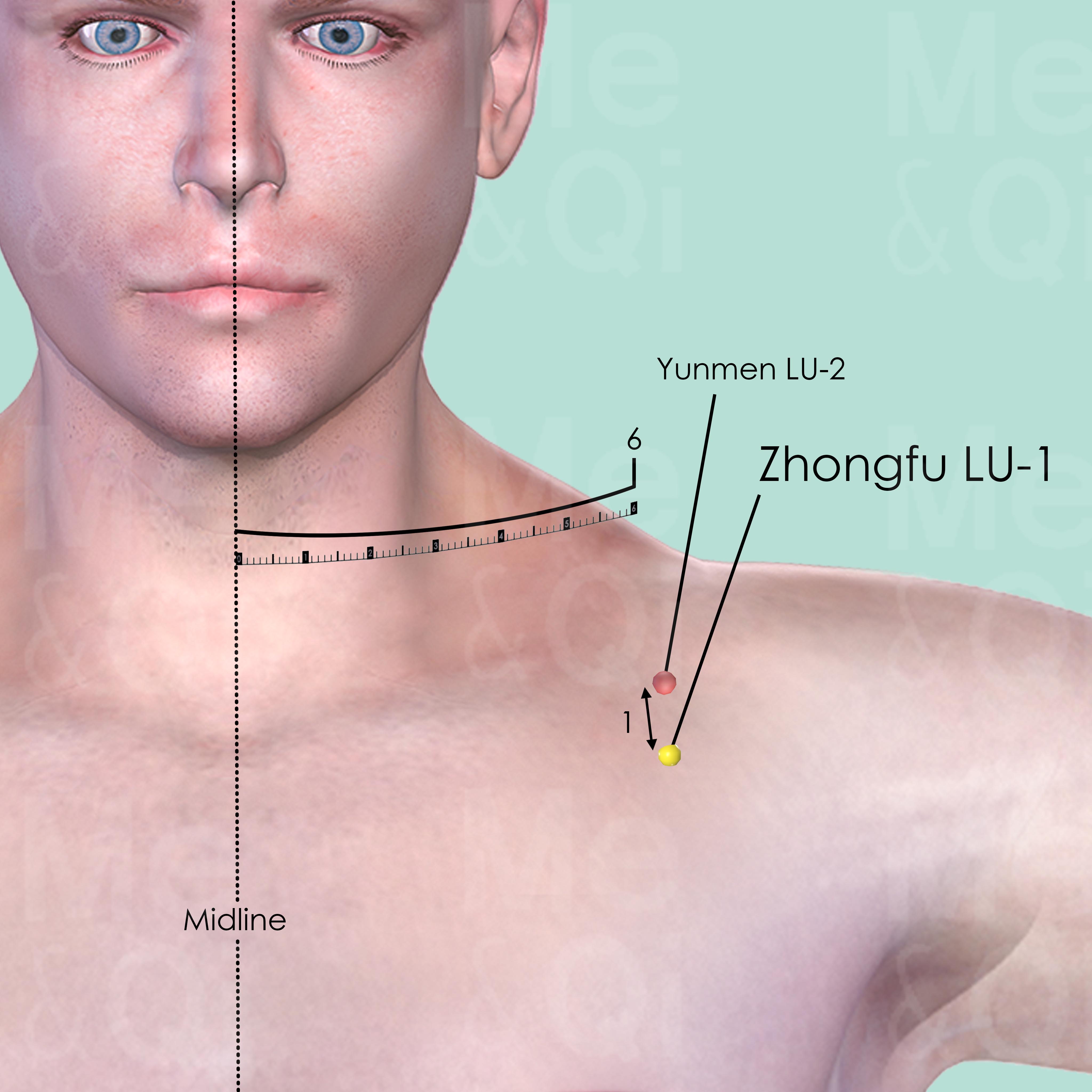
Zhongfu LU-1
On the lateral aspect of the chest, in the 1st intercostal space, 6 cun lateral to the midline, 1 cun inferior to Yunmen LU-2. Below the acromial extremity of the clavicle, slightly medial to the lower border of the coracoid process.
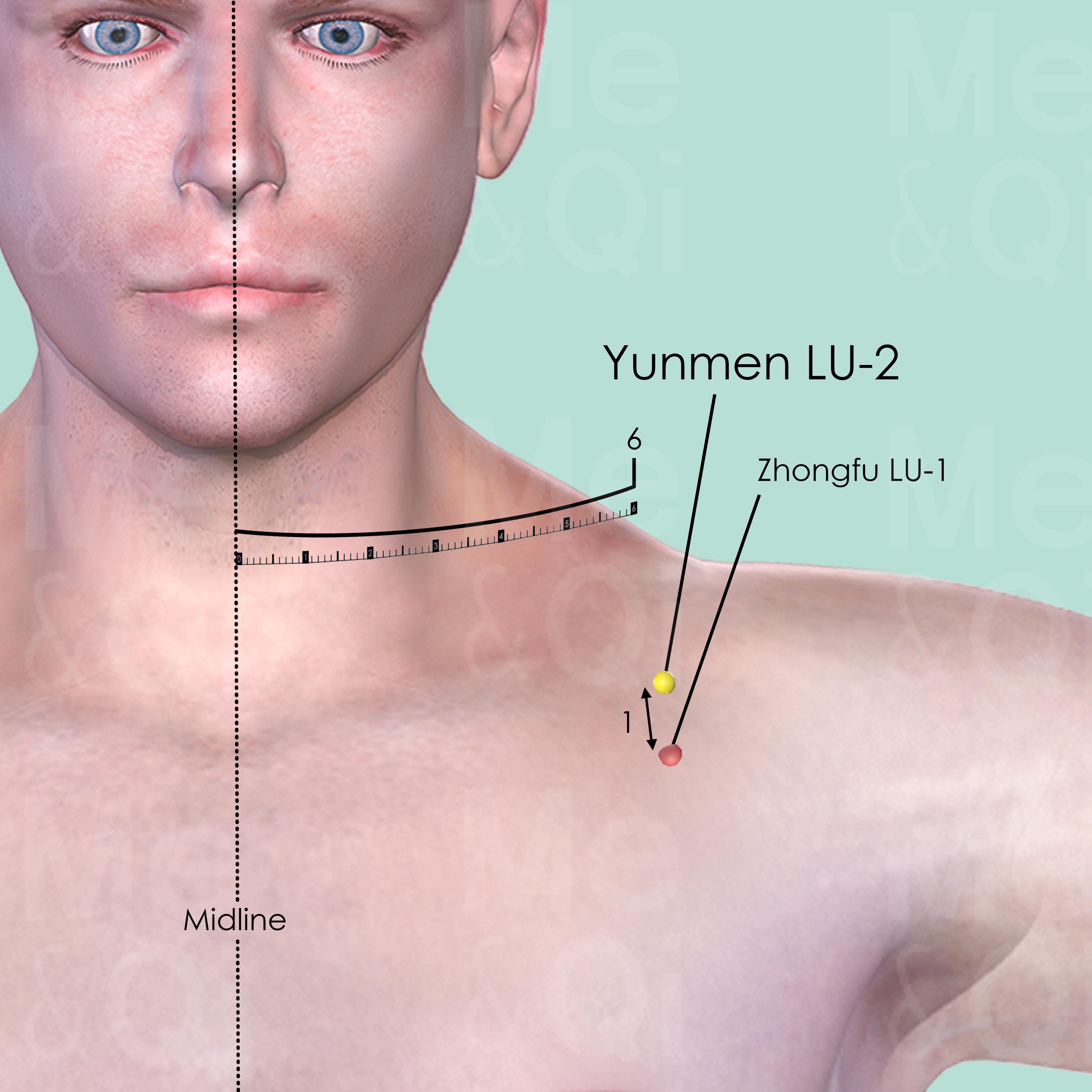
Yunmen LU-2
On the antero-lateral aspect of the chest, below the lateral extremity of the clavicle, about 6 cun lateral to the anterior midline in the centre of the deltopectoral triangle.
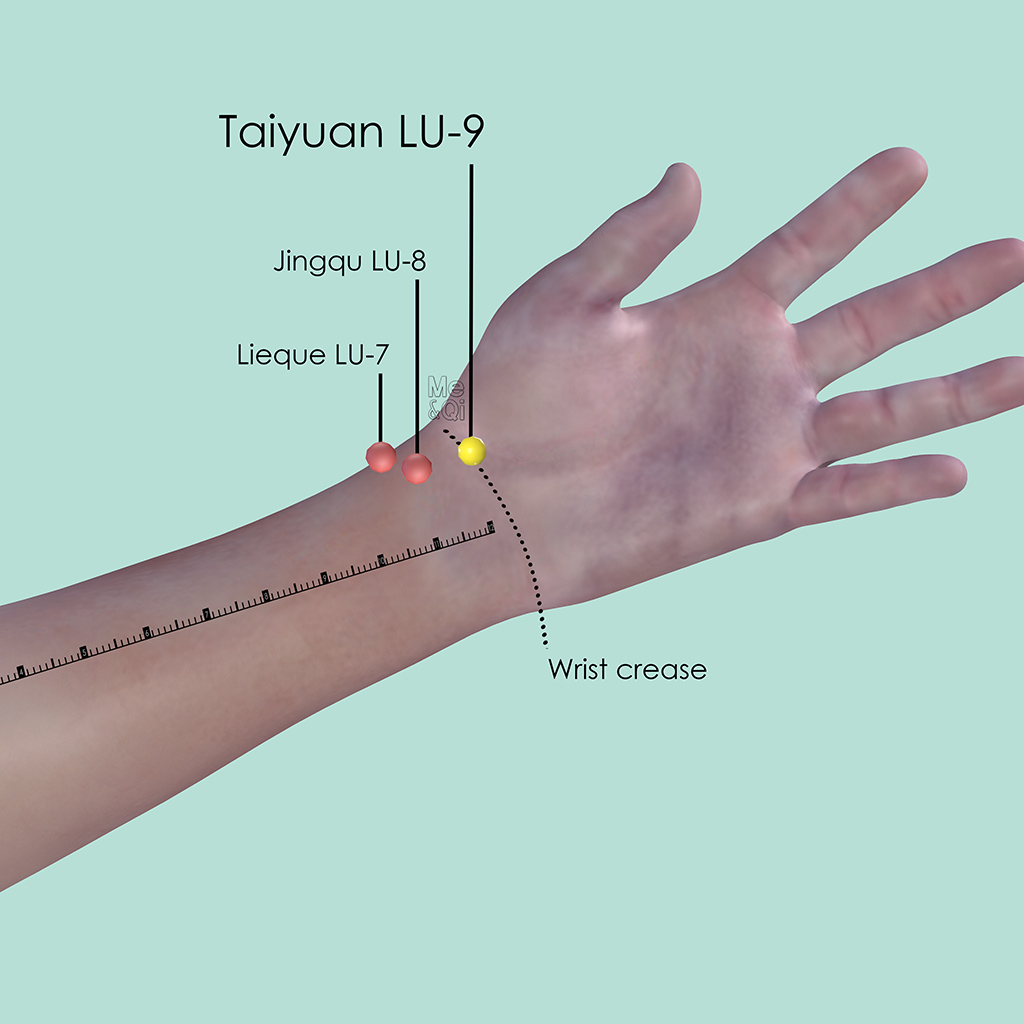
Taiyuan LU-9
At the wrist crease (wrist joint space), in the depression on the radial aspect of the radial artery and ulnar to the tendon of the abductor pollicis longus muscle.
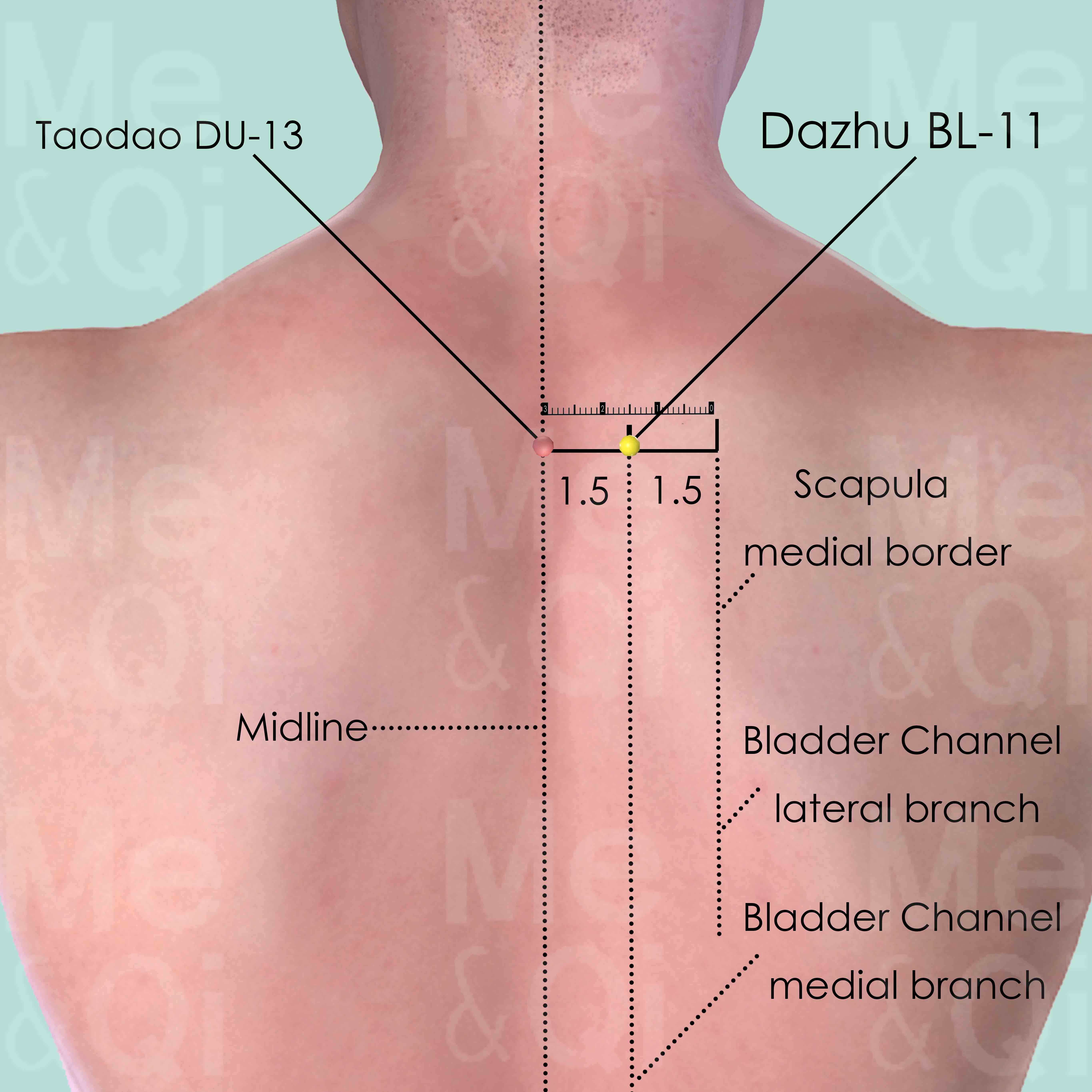
Dazhu BL-11
On the level of the lower border of the spinous process of the 1st thoracic vertebra (T1), 1.5 cun (about 2 finger-breadths) lateral to the posterior midline.
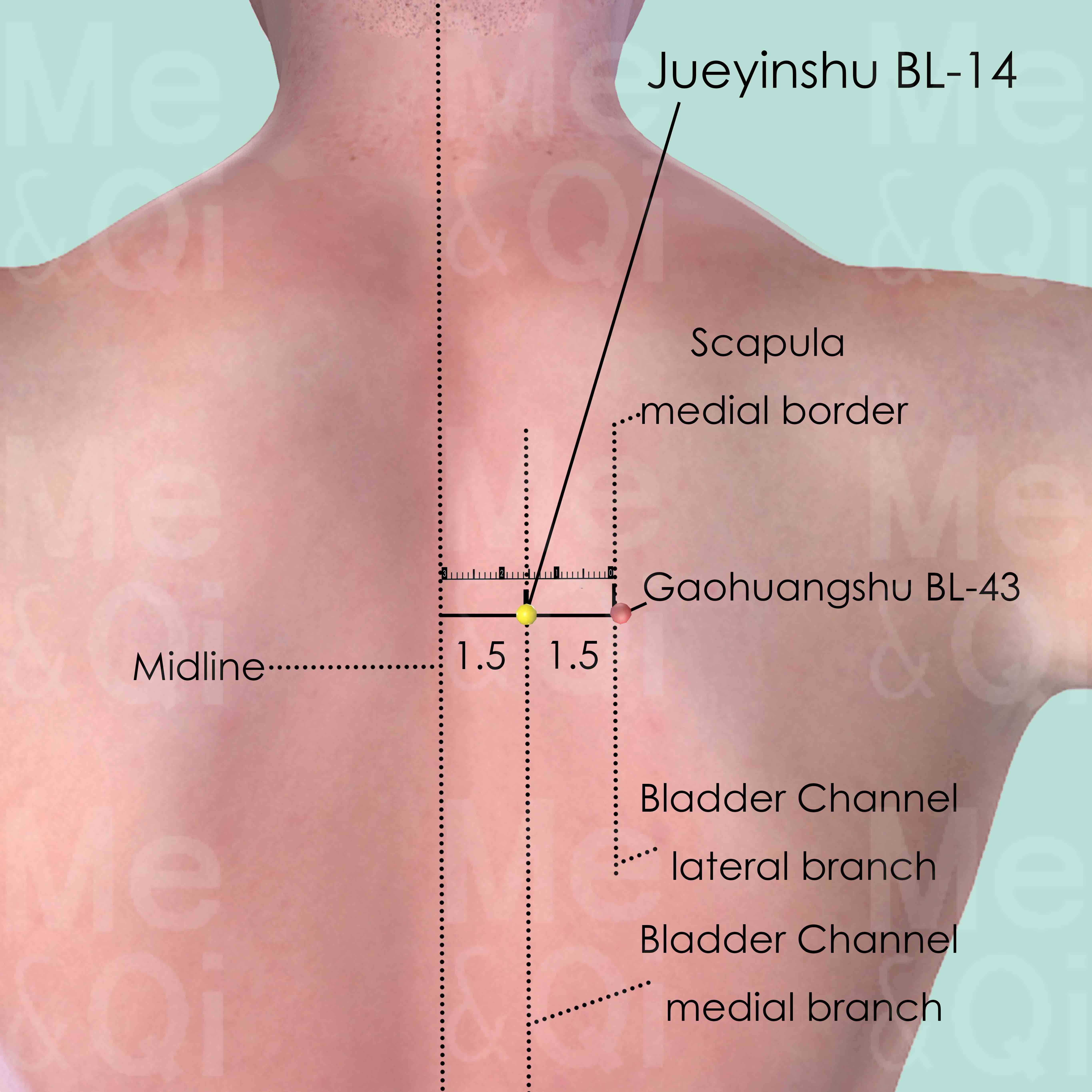
Jueyinshu BL-14
1.5 cun lateral to the lower border of the spinous process of the 4th thoracic vertebra (T4).
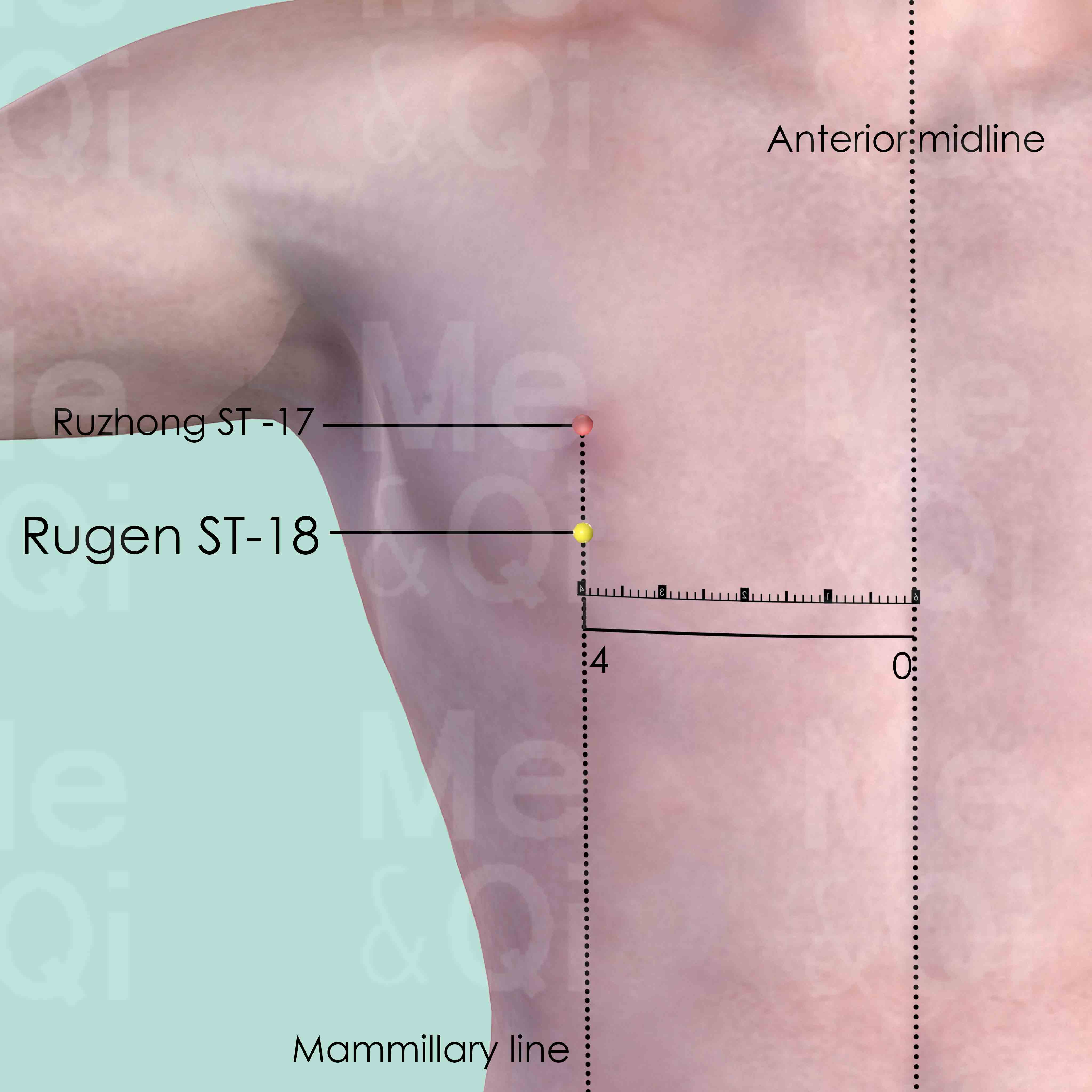
Rugen ST-18
In the 5nd intercostal space, on the mammillary line, 4 cun lateral to the anterior midline.
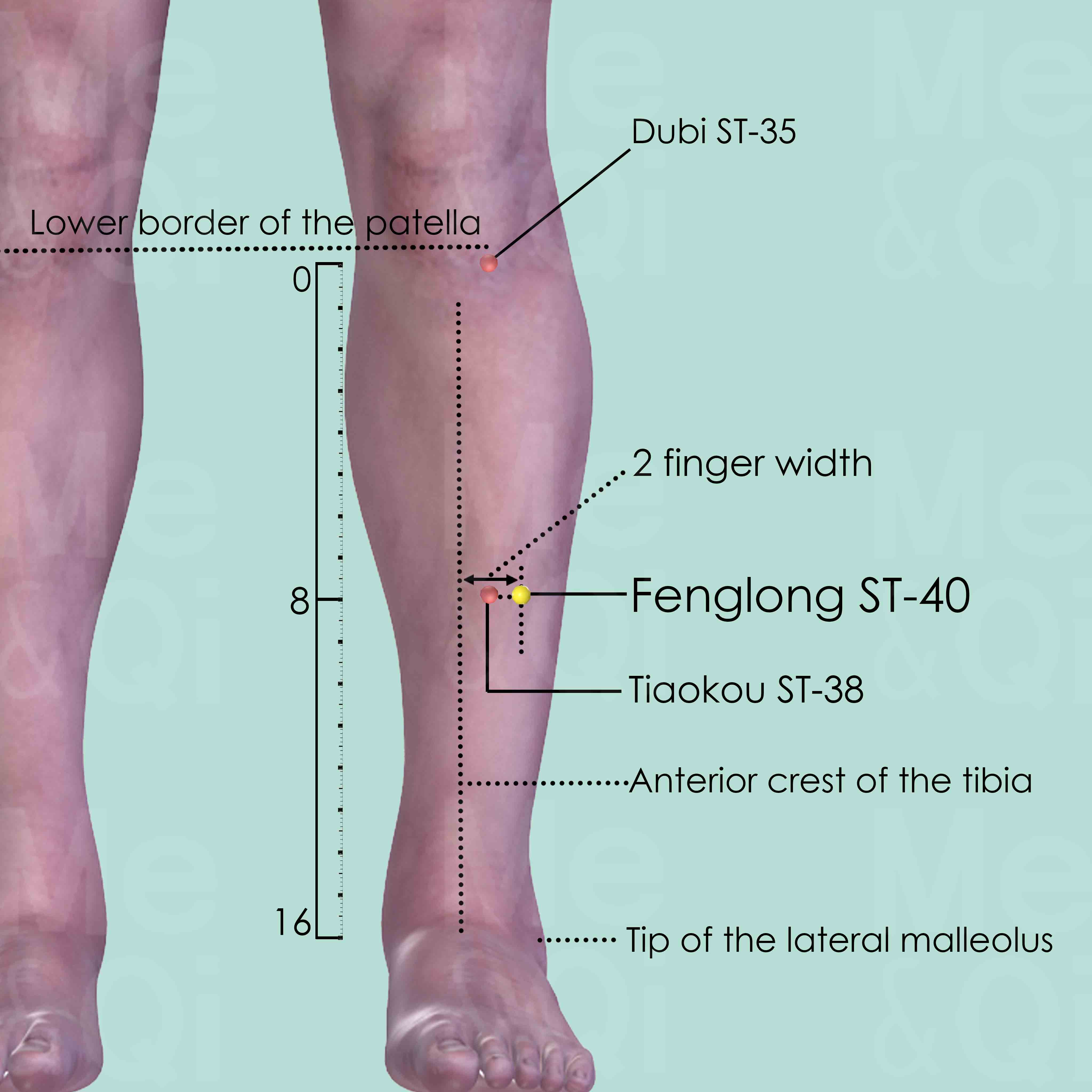
Fenglong ST-40
Midway between Dubi ST-35 and Jiexi ST-41, two middle finger-width from the anterior crest of the tibia, or one middle finger-width from Tiaokou ST-38.
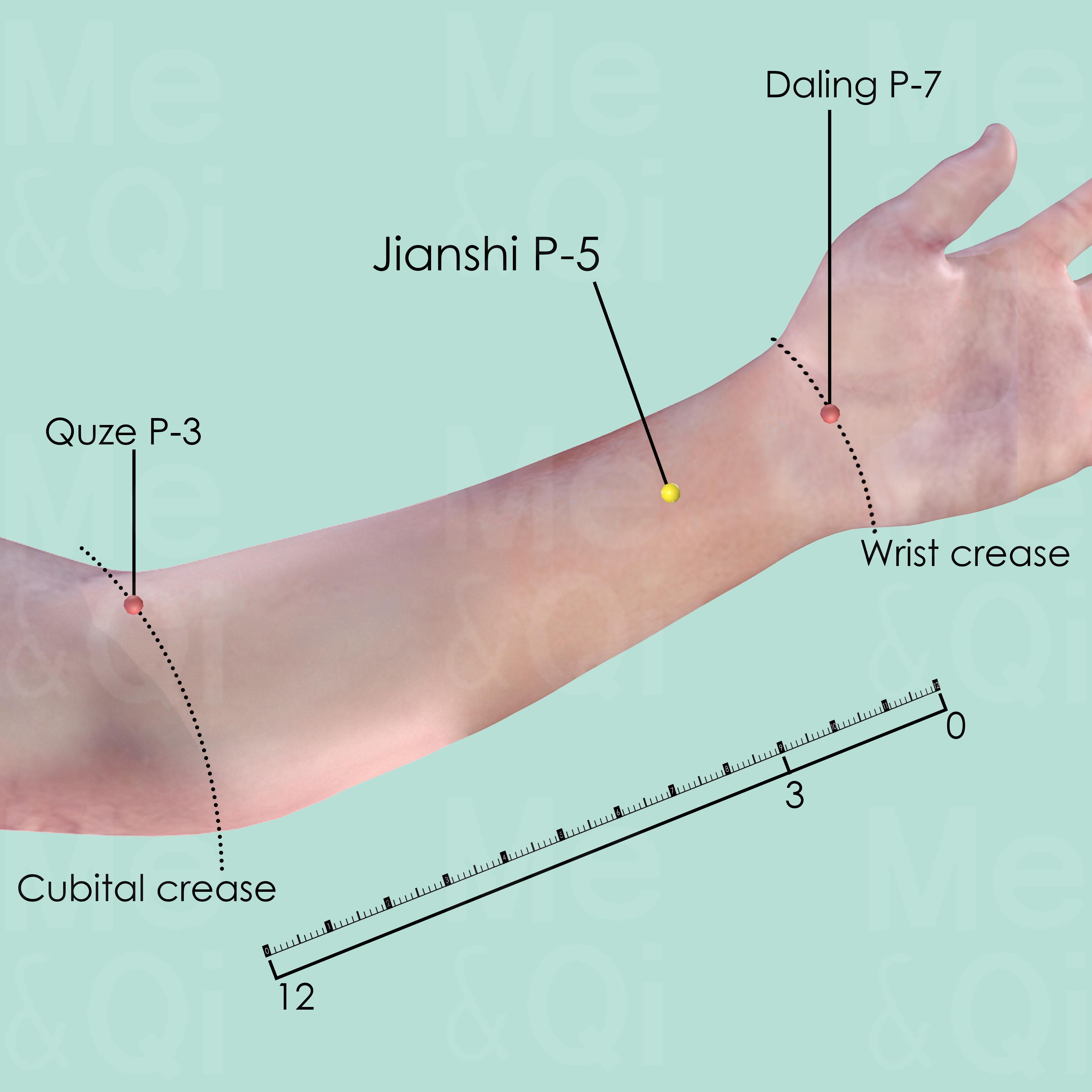
Jianshi P-5
3 cun above the transverse crease of the wrist, between the tendons of palmaris longus and flexor carpi radialis muscle.
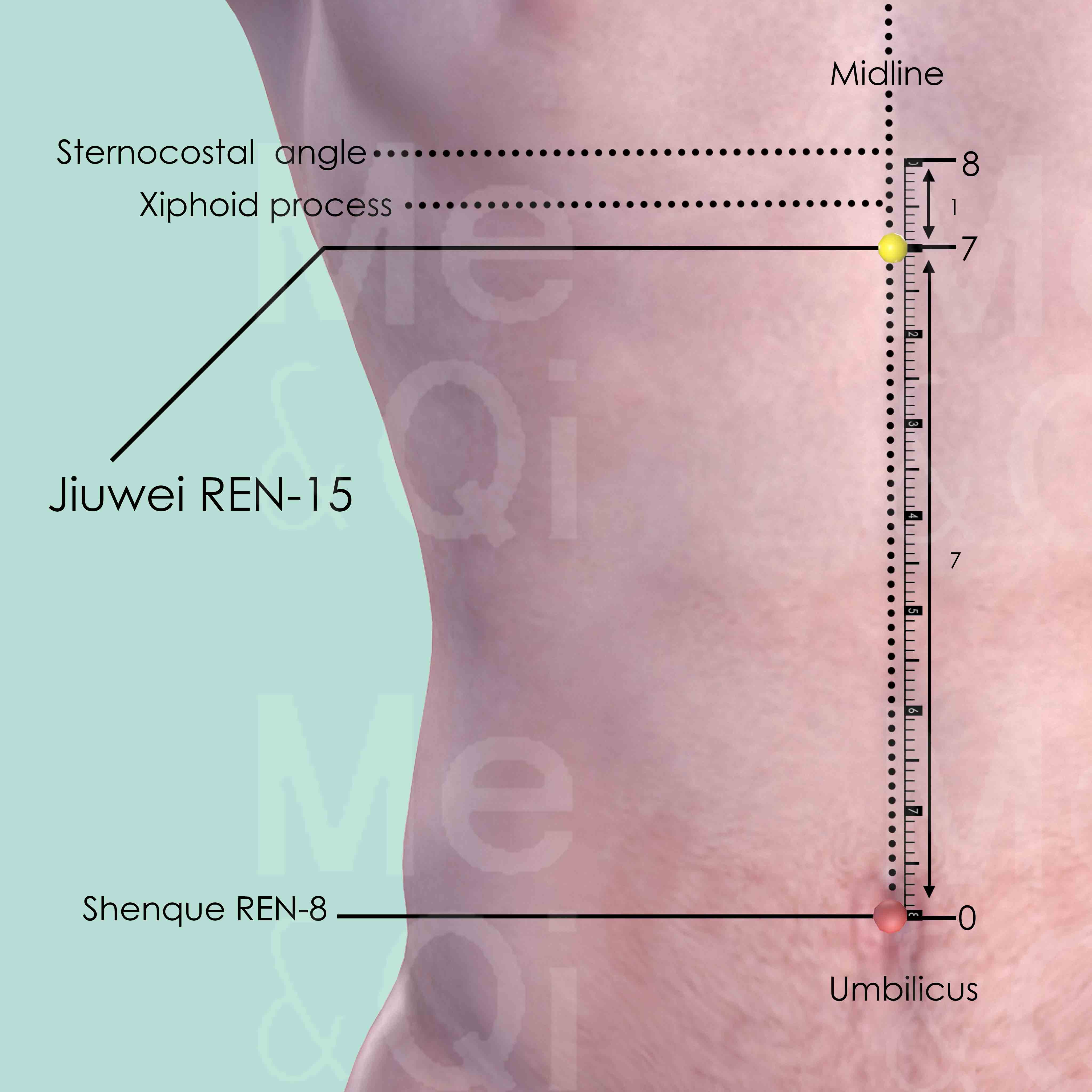
Jiuwei REN-15
On the midline of the abdomen, 7 cun above the umbilicus and 1 cun below the sternocostal angle. This point is located at the tip of the xiphoid process, which is commonly known as ‘dove-tail’ in China, hence the name of the point.
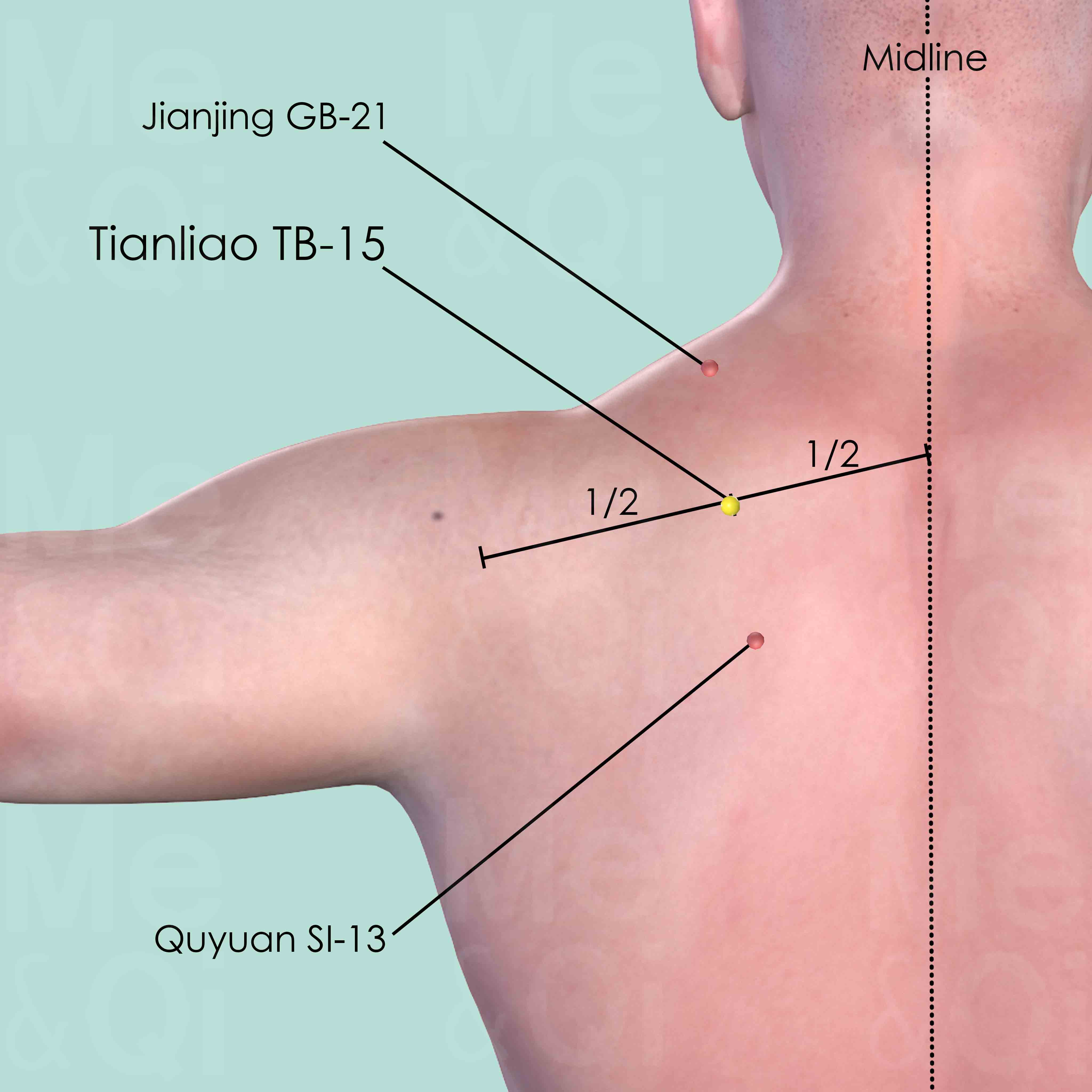
Tianliao TB-15
Midway between Jianjing GB-21 and Quyuan SI-13, on top of the superior angle of the scapula.

Shaoze SI-1
On the ulnar side of the little finger, about 0.1 cun posterior to the corner of the nail.
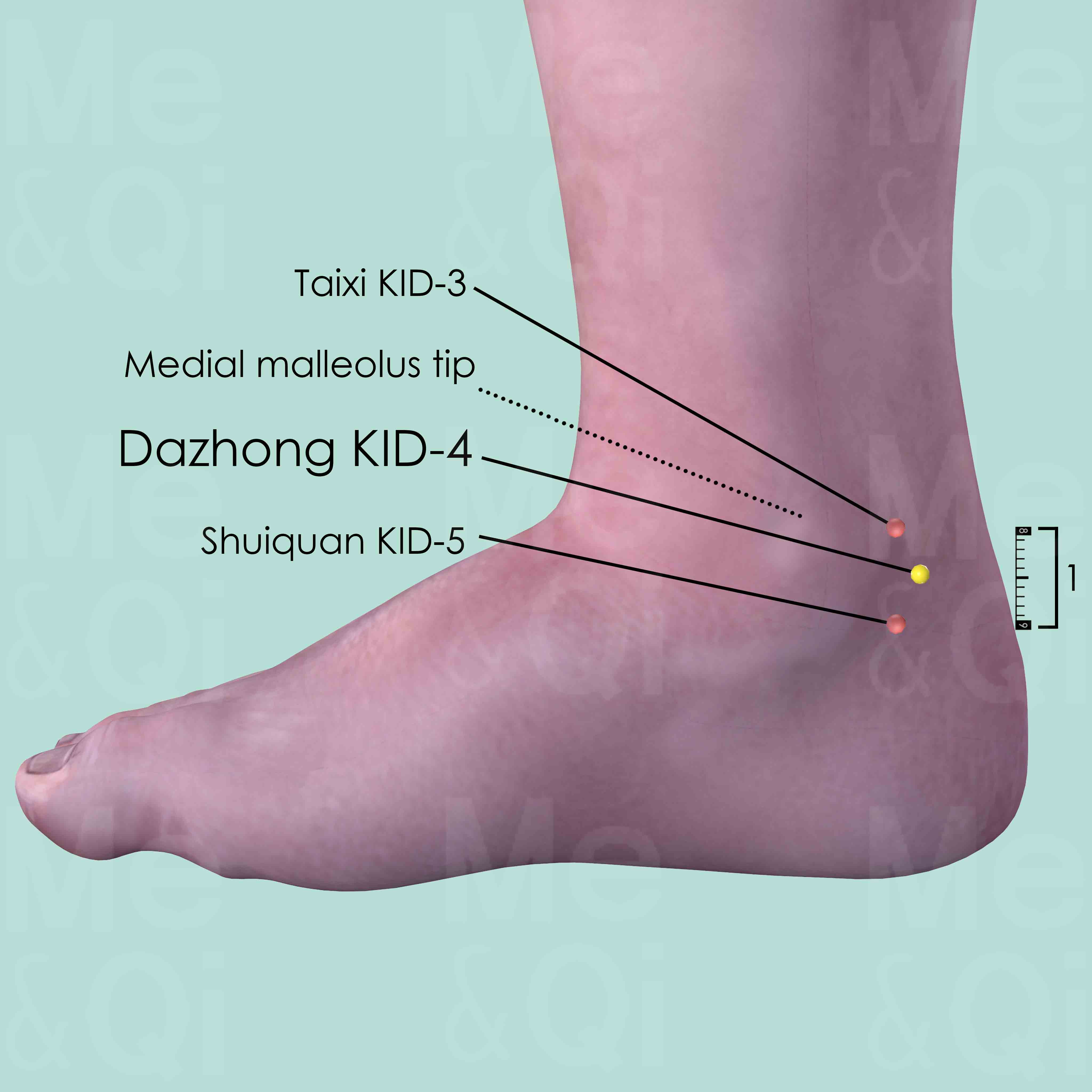
Dazhong KID-4
Posterior and inferior to the medial malleolus, in the depression medial to the Achilles tendon, superior to its insertion at the calcaneus.

